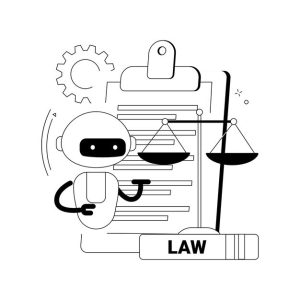Data serves as the current financial standard in the highly connected digital universe of today. The web activity of users produces crucial data whenever they communicate with AI chatbots or use social media applications. Modern organizations employ collected information to create personified services as well as targeted advertisements and better user experiences. The increasing use of personal data by organizations has led to rising legal worries affecting modern society. The evolving nature of privacy laws struggles to adapt quickly to current AI technological and digital advancements. The legal challenges regarding digital data collection require clear comprehension from both business operators and policymakers together with ordinary users.
The Role of AI Chatbots and Social Media in Data Collection
Thousands of programs now integrate AI chatbots that operate in customer service applications and healthcare advice services. The bots intentionally gather multiple types of user information including names and contact information and personal preferences with specific information that extends to health details and finance records.
All social media networks exist by coexisting with content produced by their users. User behavior patterns become apparent through every posted message as well as every interaction with likes, sharing and commenting activities. The processing system utilizes complex computational models that evaluate database information to generate behavioral predictions which improve its operational algorithms.
When users accept terms of service they grant data permissions but they normally lack complete knowledge about the extent of information collection along with its utilization practices. The disparity in knowledge between business corporations and their buyers has evolved into a central legal dispute area.
Key Legal Challenges in Data Collection
Informed Consent
The essential requirement of data privacy law demands that users must provide informed consent. In modern digital spaces the ability to issue legitimate informed consent becomes impossible to achieve. The majority of users fail to review lengthy and complex Terms of Service agreements which users typically do not read completely. AI chatbots engage in data collection during open-ended interactions in which they never specify the methods or points of data collection to their users.
The General Data Protection Regulation and California Consumer Privacy Act as well as other laws require companies to display transparent data disclosure and simple consent processes for users. The implementation of these standards faces significant obstacles when attempting to monitor platforms which continuously change at a rapid pace.
Data Minimization and Purpose Limitation
The principle of necessary data collection for specific purposes is a crucial issue regarding information management. AI chatbots and social media platforms acquire large quantities of data that exceeds the fundamental requirements for their service delivery. The excessive collection of user information results in higher chances of privacy breaches as well as noncompliance with current privacy legislation.
AI systems without valid consent access raw data that was gathered for various original purposes which includes model development. Existing privacy regulations include the principle of purpose limitation which gets violated through this practice leading to considerable legal accountability.
Cross-Border Data Transfers
Global data collection procedures are common realities in present-day operations. AI chatbots connect users to data processing servers and data storage facilities that may exist throughout international borders. The transfer of personal data outside borders proves problematic when enforcing national and regional data protection regulations except when proper safety measures can be implemented.
The EU-U.S. Privacy Shield framework became invalid which demonstrates both complex and unstable conditions within borderless data legislation. Numerous international laws confront companies that maintain AI platforms and social media services because they have to spend a lot of resources and face potential risks from noncompliance.
Profiling and Automated Decision-Making
Through profiling technologies AI chatbots and social media algorithms use gathered data to predict individual conduct while deciding matters related to people. Under GDPR among other similar regulations citizens possess the right to be excluded from automated decision systems when those mechanisms result in meaningful effects.
The automatic decision-making of chatbots for loan applications and insurance coverage and employment access as well as social media news curations with potential political influence can lead to severe legal issues. To uphold transparency companies should reveal their AI decision-making steps combined with human intervention opportunities.
Emerging Legal Responses
National governments and supervisory authorities are now responding to these challenges. The EU’s new AI strategy in the form of the proposed Artificial Intelligence Act targets extensive requirements on high-risk AI systems, especially those handling personal data. Currently, several states within the United States have either proposed or implemented AI and data privacy laws that differ from each other and from the federal laws.
Further new guidelines for ethical artificial intelligence also point to privacy as a core principle where the privacy of the users has to be integrated into the technological systems at their development stage. Openness, responsibility, and user control shall become important values in regulating the collection of data through Artificial Intelligence.
Best Practices for Compliance and Risk Mitigation
Some of the steps that organizations should take in order to reduce the legal risks associated with AI chatbots or if operating social media accounts include;. These include:
- Providing simple, effective, and understandable general notice on privacy policies.
- Introducing dialogue turns into a chatbot application that can notify the user when their information is being gathered.
- And at this point, minimizing the data that one obtains to only the necessary data needed.
- Enabling the users to easily go through several rights regarding their data including access, correction, and deletion.
- Ensuring transparency in profiling and automated decision-making processes.
Lawyers and legal departments need to collaborate with software developers, data scientists, and policy makers to understand that innovations being adopted into an organization are the right ones that will meet the changing legal requirements and ethical standards.
Conclusion
Using AI chatbots and social media for data collection has enormous advantages, but it also causes essential legal concerns. I have also come to realize that issues on consent, data minimization, cross-border transfer of data and profiling do not have straightforward answers but very many grey areas. Given the fact that there is a continuous change to the legal requirements relating to the protection of individual data, it is important for organizations to operate in a transparent, accountable and empower the users in the new world. Ethical utilization of data will not only minimize legal repercussions but also develop the confidence that is required to sustain businesses of the future in the future big data economy.










